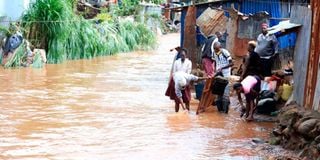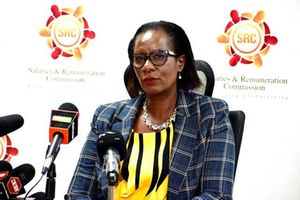Floods aftermath: Informal women workers’ saving power diminished

Flooding in Kibera after a downpour.
What you need to know:
- From her business, Mama Yusra saved Sh500 every day for her children's school children.
- For now, her focus is to rebuild her business at a place conducive to business.
For 11 years, Mama Yusra (as she prefers to be identified), reported to her workplace every day from 6am.
Her place of work was a small temporary iron-sheet shed over an open trench in the Makina area of Kibera slums, Nairobi County. From here, she sold boiled eggs and French fries.
As a single-parent raising four children, she knew that saving was the only way she would successfully educate her children.
“I want my children to live a better life than mine. All I do, I do for them,” she says.
With that in mind, every week,she would put aside Sh300 from the profits earned from selling boiled eggs in a savings group of 50 women working in the informal economy.
These women do domestic work for pay, sell fast-food like Mama Yusra, trade in second-hand clothes or grocery. None of them has insurance to cover them in case of an emergency, Mama Yusra says.
She made more profits from the French fries. From the business, she saved another Sh500 every week in a merry-go-round of 10 women and every two months, she would receive her accumulated share to pay her children’s school fees.
“In the group where we save Sh 300 weekly, we get all our savings in December. That is the time I do shopping for my children. I buy them uniforms, books, new clothes and shoes. They also feel happy to have new things. I want them to be happy that they cannot be tempted to seek happiness elsewhere,” she says.
She has three girls and one boy.
Then last April became a doom’s month for her and her household. The raging floods from the heavy rains washed away her shed. It also soaked up her household items, which need repair or replacement.
“If I use the little money I have to repair the shed, then my children will go hungry,” she says.
“I have been out of work since late April and that means I have lost many days of savings. If I remain out of work until December, then for sure, my children will be out of school and they will suffer, since I’ll have little savings in the annual savings group.”
For women in the informal economy who depend on their irregular daily income to save, disasters such as floods greatly hurt their income flow.
And without insurance to cover the losses and help them recover, their livelihoods are highly unstable and the probability of falling into extreme poverty is particularly certain.
Mama Yusra is not the only one at risk of sinking into absolute poverty. In Kenya, women account for more than 50 per cent of the 22.3 million working population, and 15 million Kenyans work in the informal economy where Mama Yusra falls.
There are ways of helping them get back on their feet and build their resilience to future climatic shocks. “These floods are reminders of how important it is to offer women in the informal economy social protection,” argues Grace Ananda, Africa policy and advocacy manager at Habitat for Humanity.
Social protection is a set of interventions whose objective is to reduce social and economic risk and vulnerability, and to alleviate extreme poverty and deprivation, explains the United Nations Food and Agriculture Organisation.
These can be in the form of social assistance, which is publicly provided conditional or unconditional cash or in-kind transfers, or public works programmes.
It can also be in the form of social insurance done as contributory programmes that cover designated contingencies affecting the welfare or income of households.
Governments can also introduce labour market protection such as providing unemployment benefits, building skills and training workers.
For now, Mama Yusra’s focus is to rebuild her business.
“My desire is to move to a better place. Not sell over an open trench. What if it rains again? Will I keep on counting losses?” she wonders.
“I'm, however, hopeful of reopening my business. But I wish the government would be more responsive and give the women whose businesses were affected unconditional grants to recover their businesses.”





